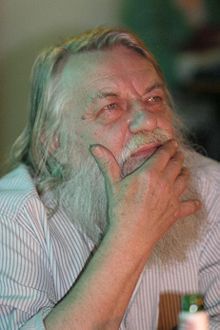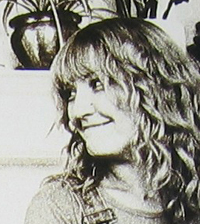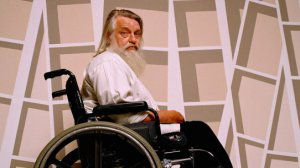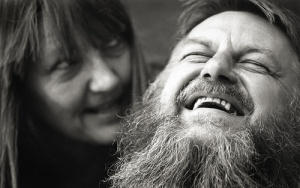| |
|
|
 Robert Wyatt and “The Merry Dance of Shared Creativity” - A Necessary Angel - July 14, 2010 Robert Wyatt and “The Merry Dance of Shared Creativity” - A Necessary Angel - July 14, 2010
ROBERT WYYATT AND "THE MERRY DANCE OF SHARED CREATIVITY"
| |
Robert Wyatt is that rare musician who has been making individualistic, quirky soulful music for years that has managed to resonate across a broad spectrum of listener, and engage some population of more youthful listeners with each successive generation. This is a good formula for making art live. Wyatt’s songs have been covered by artists such as Elvis Costello (Shipbuilding), and he can count Brian Eno, Bjork, and Fred Frith amongst his collaborators over the years. For me, Wyatt’s music has always hovered in the same beautiful universe inhabited by Scott Walker’s muse. Always singular, by times poignant, wistful, infused with wonder, and delivered with the direct nature and good humor of a man who probably sleeps quite well at night.
Wyatt has long collaborated with his wife Afreda (Alfie) Benge, a noted artist, lyricist and poet, who has penned the words to many of Wyatt’s tunes over the years. Our mutual friend Rob Ayling, noted photographer and Voiceprint records owner (the wonderful patron of a label that releases my work…. buy all thier stuff!) put us in touch for the interview. I was glad to have this discussion, if even only over e-mail, with one of the great singular talents of this or any age.
|
|
| |
|
|
PH Robert, you have become known as an artist’s artist, in that there are many prominent artists in mainstream pop culture that like to state you as an influence, and who view your work as seminal and essential to their own development. What do you think about that?
RW Percy, my record collection is more like a dusty museum than a 21st century update. I’m embarrassed to say, I know little about what younger musicians are up to. But of course it’s reassuring to hear that some of them have heard what I’ve been trying to do…..and I’m especially grateful to those who’ve used my material. Most recently the Orchestre National De France, Mop Meu Machiine (also French) and the heavenly Unthank Sisters, not to mention Annie Whitehead’s band featuring Julie Tippetts and Jennifer Maidman, Karen Mantler with John Greaves ( that last project not yet available on record), and several other kind hearted people.
PH I’ve been listening to your recording Comicopera, and with each listen, come away with another layer of emotional connection. The story telling is rich, filmic, poignant, lyrical, and comical at times. Can you tell me a little bit about the creative process concerning the writing and recording of this album?
|

|
RW
Comicopera has several geneses. From scraps of paper with momentary thoughts onto recorded equivalents, scattered around my room- sometimes for years! The coherence comes in the editing. More than with previous records, I assumed that the pieces would take on a life of their own, without my interfering with a plan. The eventual sequence to become apparent in the studio (mostly in the last few years with the engineer I met at Phil Manzanera’s studio, Jamie Johnson). And, perhaps from enjoying so many very old records, this time I really asked a lot of the musicians, I wanted to make a record of total music, not just “vocal with instrumental accompaniment”, although the final order was guided by the lyrics, by what is being said. For a long time I’ve felt right making records with two ‘sides’ like records used to be. But for Comicopera, I found myself turning to the idea of music in three parts, like posh symphonies. But not very, eh?
PH It seems to me that it is often a perfect storm of circumstances that creates an audience for “difficult” artists. Pop culture is a fickle mistress, who is difficult to serve. How do you see the “canon” of your work fitting into the overall universe of all things “pop”?
RW Pop(ular) music is to me a great resource, and even One Hit Wonders can make at least one terrific record-But I’m not in the market competing for mass attention; I just have to shift enough records to earn a living. So a more apt comparison would be with a little local cafe, or baker’s shop. (i.e. not the kind of retail outlet that depends on media saturation.) So when I was told that the most powerful disc-jockeys might not like Fred Frith’s solo on I’m a believer my automatic reaction was, “who gives a fuck?”)
PH Your particular musical gift always brings to mind our friend Fred Frith. Fred has a unique way of bending the strange around to the poignant when you least expect it. He does it through a sort of frenetic worrying torrent of sounds that break out at once into lyrical atmospherics and whimsy. You come to the poignant through seemingly indirect, observant, lyrical revelations. How do you conceive of a lyric like: “Cuckoo Madame with your teddy bear eye, yellow fingers clinging to the chain link fence. Bombers above you. Bombers behind you.” (“Cuckoo Madame, from the album Cuckooland). I’m not sure what it means, but it makes me want to cry….
AB (This question was answered by Robert’s Wife and Collaborator, Alfreda (Alfie) Benge)
All I can do is explain how this poem happened. The line you quote from Cuckoo Madame was a totally accurate description of what my eyes saw. While watching from the window of a seaside chalet with no-one else around. She was, as described, grasping the wire on a fence with her yellow finger-like claws. Her eyes just like a teddy bear’s glass eyes. Exactly the same colours. The first time Isaw her there was a bomber exercise going on in the air. The lovely peace shattered by horrible noisy low-flying jets. She sat there with bombers swooping overhead. She came regularly twice a day for over a week. I was on my own, and she was my only visitor. My first instinct was antagonistic. I knew there was a meadow pipit nesting nearby, and I knew cuckoos often used meadow pipits nests to plant their eggs. She was the villain.
|

|
Then, I started to think about her and her life. She never saw her chick, had never seen her parents. A really solitary madam. Soon she’d be off to Africa , and later her chick would make the same journey all alone. No-one to guide it. What a lonely life. And what had happened in cuckoo history to condemn her to such a life? So I imagined being her. And remembering my first reaction, was reminded of the way people are judged without any attempt to understand them. It had recently happened to me, (it was quite traumatic) and no doubt happened to all the outsiders, strangers, foreigners that become hate figures. People who often have tragedies in their lives that we’re oblivious to. Most of the stuff I do when words come first happen in a similar way. I try and look hard. That’s how it starts. I try to pay real attention to something in the physical world, and often that will spark off thoughts about other things. It’s like nature study with added daydreaming. But basically my eyes are OPEN. When the music comes first, I write with my eyes very SHUT, and my ears very OPEN. I Just dive into the music and try and drag out the words that are hiding in there. What film am I watching? ‘Old Europe’ for instance was definitely a black and white French film. The music absolutely dictates the subject matter. In Lullaby for Hamza, three notes just said ‘lullaby’ to me. So I wrote one for someone who needed one.
PH What has been the effect upon you of the almost total collapse of the music industry? Has your way of working, your audience, and the way your work reaches your audience helped you escape the carnage somewhat?
RW The record industry, like the leisure industry and the food industry, may boom, bust, do the hoochie-coochie, whatever, people still listen, play and eat. Been doing it for tens of thousands of years. Widespread ‘free’ downloading is a bit scary for us though, like all theft, naturally)
PH I am curious to know what young artists (if you listen to any) you think are creating significant work.
RW I’m well aware that there are lots of terrific musicians out there, young (and not so…) In all genres. Here and around the planet. And mass-market pop music seems as entertaining as ever- I’ve listened to Timbaland and Cheryl Cole, and think they’re really good at what they do.(I’m not interested in the various snobberies around show-business.) It’s all just people trying to do their best. There’s room for all of us, I’d like to think..
PH Much like Scott Walker, you are an artist that the pop culture is always in the process of “catching up to”…it’s a brilliant historical comment, but may mean that some potential benefits of the catching up will not be available until you are gone! What is your take on this phenomenon?
RW See 1 again! Plus, I know that I myself am still catching up on music from before MY time, from Plainchant (a liturgical chant form) to Paul Robeson. Even the ‘originators’ of British popular music as a global phenomenon based most of their original material on that of (mainly Black American) predecessors. Made it ‘New’, as every generation does. Or they simply spread the word, just with a different accent; it’s all part of the merry dance of shared creativity.
|

|
PH Your music is quite filmic and imagistic to me. Are you a film lover? How does the imagery of life as found in film, affect your work if at all? Have you had much music placed in film?
RW Yes indeed, I admire lots of film makers, and have been particularly affected by John Cassavetes (Shadows), Eisenstein, Ozu, Eric Rohmer– and many of the more widely known film makers from early Hitchcock to Mike Leigh. And Alfie (a qualified film editor and Robert’s Wife) introduced me to the wonders of many films from around the world. Um…….where were we? Oh yes. Your actual question! I see my transition from live performance to making records as like the transition from live theatre to making films, Necessity being the mother of invention in my case.
PH I’ve always wanted to hear a duet between you and Marianne Faithful, this may seem wacky to some, but I think it would be fantastic! What artists would you like to collaborate with that you have not thus far?
RW I choose collaborators that the piece I’m working on seems to want. There are still people I’d like to do music with though, but I don’t wish to embarrass them by naming them in, as it were, public! Oh, alright then, Sinead O’Connor.
>> L'interview sur le site de A Necessary Angel
|




